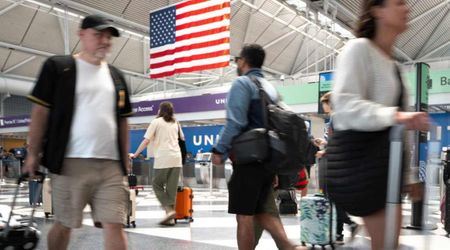Last-Minute Shoppers Looking for Quick Deliveries are Targeted by Scammers; Here's why That Happens

NRF issues cyber threat warnings ahead of festive season
The holiday season is upon us, and with it comes the excitement of festive celebrations and the joy of giving. However, as consumers open their wallets to partake in the holiday shopping frenzy, they may inadvertently be exposing themselves to an increased risk of fraud. According to the National Retail Federation, this year's holiday shopping is expected to reach record spending levels, but those who engage in last-minute shopping face a threat from cyberscams.

Holiday shopping surge predicted to break records
The National Retail Federation's projections indicate that holiday spending is set to break records this year. As consumers eagerly hunt for the perfect gifts, the rush of last-minute shopping may inadvertently expose them to potential fraud. Paul Fabara, Chief Risk Officer at Visa, warns that procrastination becomes a key element for fraudsters to exploit, as per Yahoo! Finance. They rely on the assumption that consumers, in their haste to secure last-minute deals, may fall victim to enticing offers promising swift delivery within 24 hours.
The rush to secure gifts often leads consumers to overlook potential red flags, making them more susceptible to scams. Fraudsters capitalize on the urgency of last-minute shoppers, enticing them with discounted prices and guaranteed swift deliveries. After falling for this, consumers not only miss out on receiving their ordered items but also face the risk of unauthorized transactions on their credit cards.

From missed deliveries to unauthorized transactions
The consequences of succumbing to last-minute holiday scams can be a double whammy for consumers, since fraudsters can later exploit compromised credit cards to conduct a series of unauthorized transactions unrelated to the consumer. In the event of falling victim to a scam, the first crucial step is to contact the financial institution, which can monitor accounts for suspicious activities and guide consumers.
AI fraud risks on the rise
This holiday season brings forth new risks tied to artificial intelligence, posing an additional threat to consumers. AI can easily impersonate individuals, particularly through voice passwords to target those who rely on voice authentication. To mitigate this risk, the adoption of multifactor authentication, a process that adds extra layers of security beyond passwords, is crucial. This may include verifying a code sent via email or text, answering a secret question, or utilizing fingerprint scanning.

Scams you need to know about
Digital skimming can result in the theft of credit or payment card information from online stores. Consumers should exercise caution when making online purchases and ensure the security measures of the website.
Phishing and social engineering uses false websites or malicious advertising to steal customer data. Awareness and skepticism are crucial in recognizing and avoiding such scams.
ATM or point-of-sale skimming aims to steal personal identification numbers or other data. Checking ATMs and point-of-sale terminals for any suspicious devices and covering PIN entries can help minimize the risk.
One-Time-Passcode bypass schemes send false prompts in an attempt to gain unauthorized access to consumer accounts. Remaining cautious and verifying the legitimacy of any unexpected prompts can thwart potential scams.
Gift card payment scams
The Better Business Bureau highlights the alarming rise of gift card payment scams, which have surged by 50% in the past year. Consumers should exercise caution when presented with enticing offers, especially for hot and in-demand items. Consumers should verify the legitimacy of websites, check return policies, and be wary of deals that seem too good to be true.

As scams evolve, utilizing multifactor authentication, being mindful of phishing attempts, and staying vigilant against physical and digital theft can help ensure a joyful and secure holiday season.























